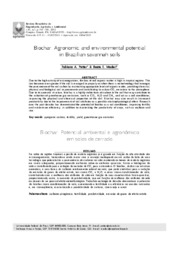Biochar: agronomic and environmental potential in Brazilian savannah soils.
Biochar: agronomic and environmental potential in Brazilian savannah soils.
Author(s): PETTER, F. A.; MADARI, B. E.
Summary: Due to the high activity of microorganisms, the loss of soil organic matter is high in tropical regions. This loss becomes even greater if the soil is managed improperly or when there is no technology that leverages the permanence of the soil carbon by maintaining appropriate levels of organic matter, providing chemical, physical and biological soil improvements and contributing to reduce CO2 emissions to the atmosphere. Due to its aromatic structure, biochar is a highly stable form of carbon in the soil that may contribute to the reduction of greenhouse gas emissions, such as CO2, N2O and CH4, and act as a soil conditioner, improving the physical and chemical properties of the soil. Biochar may also result in increased productivity due to the improvement of soil attributes or a possible electrophysiological effect. Research over the past decades has demonstrated the potential of biochar as a soil conditioner, improving fertility and nutrient-use efficiency, in addition to maximising the productivity of crops, such as soybean and rice.
Publication year: 2012
Types of publication: Journal article
Unit: Embrapa Rice & Beans
Keywords: Carbono, Carbono pirogênico, Cerrado, Efeito estufa, Emissão de gases, Fertilidade do solo
Observation
Some of Embrapa's publications are published as ePub files. To read them, use or download one of the following free software options to your computer or mobile device. Android: Google Play Books; IOS: iBooks; Windows and Linux: Calibre.
Access other publications
Access the Agricultural Research Database (BDPA) to consult Embrapa's full library collection and records.
Visit Embrapa Bookstore to purchase books and other publications sold by Embrapa.

